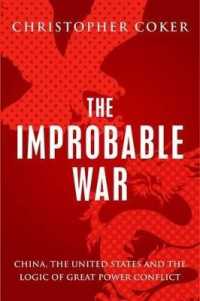- ホーム
- > 洋書
- > 英文書
- > Philosophy
Full Description
This text seeks to provide an answer to the perennial question "what is truth"? According to the global anti-realist the trust conditions of all classes of sentences are detectable by speakers. The author argues that the only way to be a global anti-realist is to maintain that the truth conditions of all sentences are the conditions under which they cohere with a system of beliefs. Global anti-realism is a form of coherence theory of truth. Realists are committed to some form of correspondence theory. Both camps are opposed to deflationary accounts of truth according to which truth is not a property of sentences. This book examines the arguments for and against anti-realism and traces its consequences and metaphilosophical implications.
Contents
What is global anti-realism?question; the deflation of truth; how to be a global anti-realist; the metaphysics of anti-realism. Correspondence and coherence: reference and correspondence; what is not wrong with the correspondence theory; how to refute the correspondence theory; coherence, truth and knowledge; purported problems with coherentism. The meaning of global anti-realism: meaning and truth; the interpretation of realism; the interpretation of anti-realism; a new look for meaning theories; replies to realist objections; meaning and holism; objections to holism confuted. Consequences of global anti-realism: specifying the specified system of beliefs; the myth of an ideal system; what truth is; "sic transit veritas"; relatively speaking; a few comments on logic; the refutation of scepticism; the end of philosophy.







